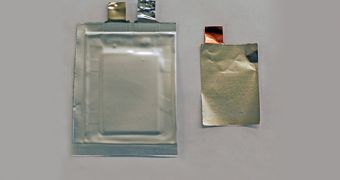Devices have been gaining a much longer battery life lately, but that's more because of better energy efficiency than improvements to power packs. Fortunately, better batteries are on the way as well.
Li-ion batteries are the best and most common type of power packs found in everything from portable electronics to cars.
Unfortunately, they haven't been advancing quite as fast as general technology, since the higher a charge gets, the bigger the danger of catching fire.
Clearly, that's bad, especially since batteries always come into contact with your lap or table top in a laptop, and everything else has a similar design for that matter.
Now, a company spun off MIT, called Solid Energy Systems, or Solid Energy for short, is putting together a new sort of Li-ion battery.
In this new battery, the lithium metal is coated in a thin polymer, just like the solid electrolyte that others have used, but much, much thinner.
Thus, lithium ions aren't slowed down, which in turn means that the battery doesn't need to be heated to work.
A liquid electrolyte is used too, to prevent short circuits, but this one is different from normal as well, an ionic liquid to be precise, which is not flammable, further cutting fire risks.
Altogether, the new design allows for a Li-ion battery capacity increase of 30%, and with large-scale manufacturing systems and further refinements, it should even be possible to turn the gain into a 40% improvement.
All this for a cost of just $130 / €96.73 per kilowatt-hour, which is perfectly in line with the goals of the Department of Energy, for making electrical vehicles affordable to the masses.
It's impossible to tell how true the claims are, and even if they are, Jeff Dahn, professor of physics and chemistry at Dalhousie University, is concerned that they will come at the cost of a reduction in recharge times. Also, ionic liquid electrolytes aren't exactly cheap. They are only ever made in low volumes at present.

 14 DAY TRIAL //
14 DAY TRIAL //